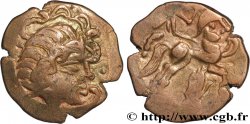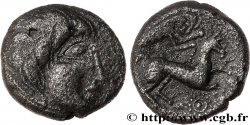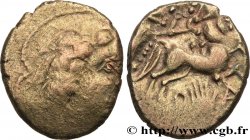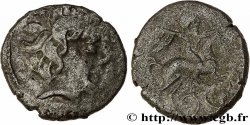v15_0372 - PICTONES (Area of Poitiers) Denier DVRAT / IVLIOS
MONNAIES 15 (2002)
Starting price : 160.00 €
Estimate : 300.00 €
Realised price : 160.00 €
Number of bids : 1
Maximum bid : 176.00 €
Starting price : 160.00 €
Estimate : 300.00 €
Realised price : 160.00 €
Number of bids : 1
Maximum bid : 176.00 €
Type : Denier DVRAT / IVLIOS
Date: c. après 51 avant J.-C.
Mint name / Town : Poitiers (86)
Metal : silver
Diameter : 16 mm
Orientation dies : 6 h.
Weight : 1,96 g.
Rarity : R1
Coments on the condition:
Ancienne patine. Faiblesse de frappe sur l’arrière de la chevelure et sur l’avant du cheval
Catalogue references :
Predigree :
Monnaie provenant du stock Maison Platt
Obverse
Obverse legend : DVRAT.
Obverse description : Tête diadémée à gauche.
Reverse
Reverse legend : IVLIOS À L'EXERGUE.
Reverse description : Cheval libre galopant à droite ; au-dessus, un ornement en forme de petit temple à trois colonnes.
Commentary
Quatre deniers de ce type sont conservés à la BN. La légende DVRAT IVLIOS est complète au droit comme au revers. Les éléments d'architecture se retrouvent assez peu sur les monnaies gauloises ; les seules occurrences sont le temple et la colonne isolée.








 Report a mistake
Report a mistake Print the page
Print the page Share my selection
Share my selection Ask a question
Ask a question Consign / sell
Consign / sell
 Full data
Full data









